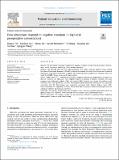Files in this item
How physicians respond to negative emotions in high-risk preoperative conversations
Item metadata
| dc.contributor.author | Tie, Bingyu | |
| dc.contributor.author | Liu, Xinchun | |
| dc.contributor.author | Yin, Meng | |
| dc.contributor.author | Humphris, Gerald | |
| dc.contributor.author | Zhang, Yi | |
| dc.contributor.author | Liu, Huaqing | |
| dc.contributor.author | Zhao, Ya | |
| dc.contributor.author | Wang, Qingyan | |
| dc.date.accessioned | 2022-03-24T09:40:29Z | |
| dc.date.available | 2022-03-24T09:40:29Z | |
| dc.date.issued | 2022-03-01 | |
| dc.identifier | 275065834 | |
| dc.identifier | 47112c79-d10a-4d81-a418-02786488665e | |
| dc.identifier | 85111034272 | |
| dc.identifier | 000820505900011 | |
| dc.identifier.citation | Tie , B , Liu , X , Yin , M , Humphris , G , Zhang , Y , Liu , H , Zhao , Y & Wang , Q 2022 , ' How physicians respond to negative emotions in high-risk preoperative conversations ' , Patient Education and Counseling , vol. 105 , no. 3 , pp. 606-614 . https://doi.org/10.1016/j.pec.2021.06.022 | en |
| dc.identifier.issn | 0738-3991 | |
| dc.identifier.other | RIS: urn:806F0C5232B6FB7B117361173B2E6F69 | |
| dc.identifier.other | ORCID: /0000-0002-4601-8834/work/97129768 | |
| dc.identifier.uri | https://hdl.handle.net/10023/25078 | |
| dc.description | This work was supported by the China Medical Board, CMB 14-200. | en |
| dc.description.abstract | Objective To investigate physicians’ responses to negative emotions in high-risk preoperative conversations; and to explore the influencing factors of these responses. Methods One hundred and sixty-two audio recordings were coded using the Chinese Verona Coding Definition of Emotional Sequences (VR-CoDES). Big Five Personality Inventory Brief Version and Emotional Intelligence Scale were administered to explore the influencing factors of physicians’ responses. SPSS 24.0 and R 3.6.3 LME4 Package were used for data analysis. Results Reduce Space (83%), referring to physicians’ responses reducing the opportunities of patients to disclose emotions, was physicians’ most frequent response to patients or families’ emotions. The main responses were Information-advice (ERIa) and Ignoring (NRIa). Younger age, female, Agreeableness and Openness were factors positively associated with Explicit Provide Space (EP); Neuroticism was negatively correlated with EP. Extroversion was negatively correlated with Explicit Reduce Space (ER); Conscientiousness was negatively correlated with both EP and ER responses. Emotional intelligence had no significant influence on physicians’ responses. Conclusion The majority of physicians were inclined to reduce space by providing information advice or ignoring. Physicians’ responses were correlated with their gender, age and personality traits. Practice Implications The trainees’ gender, age and personality should be considered when conducting doctor-patient communication skills training. | |
| dc.format.extent | 9 | |
| dc.format.extent | 748459 | |
| dc.language.iso | eng | |
| dc.relation.ispartof | Patient Education and Counseling | en |
| dc.subject | Chinese VR-CoDES | en |
| dc.subject | High-risk preoperative conversations | en |
| dc.subject | Physicians’ responses | en |
| dc.subject | Influencing factors | en |
| dc.subject | RD Surgery | en |
| dc.subject | NDAS | en |
| dc.subject | MCC | en |
| dc.subject.lcc | RD | en |
| dc.title | How physicians respond to negative emotions in high-risk preoperative conversations | en |
| dc.type | Journal article | en |
| dc.contributor.institution | University of St Andrews. School of Medicine | en |
| dc.contributor.institution | University of St Andrews. Sir James Mackenzie Institute for Early Diagnosis | en |
| dc.contributor.institution | University of St Andrews. WHO Collaborating Centre for International Child & Adolescent Health Policy | en |
| dc.contributor.institution | University of St Andrews. St Andrews Sustainability Institute | en |
| dc.contributor.institution | University of St Andrews. Population and Behavioural Science Division | en |
| dc.contributor.institution | University of St Andrews. Health Psychology | en |
| dc.identifier.doi | https://doi.org/10.1016/j.pec.2021.06.022 | |
| dc.description.status | Peer reviewed | en |
This item appears in the following Collection(s)
Items in the St Andrews Research Repository are protected by copyright, with all rights reserved, unless otherwise indicated.

